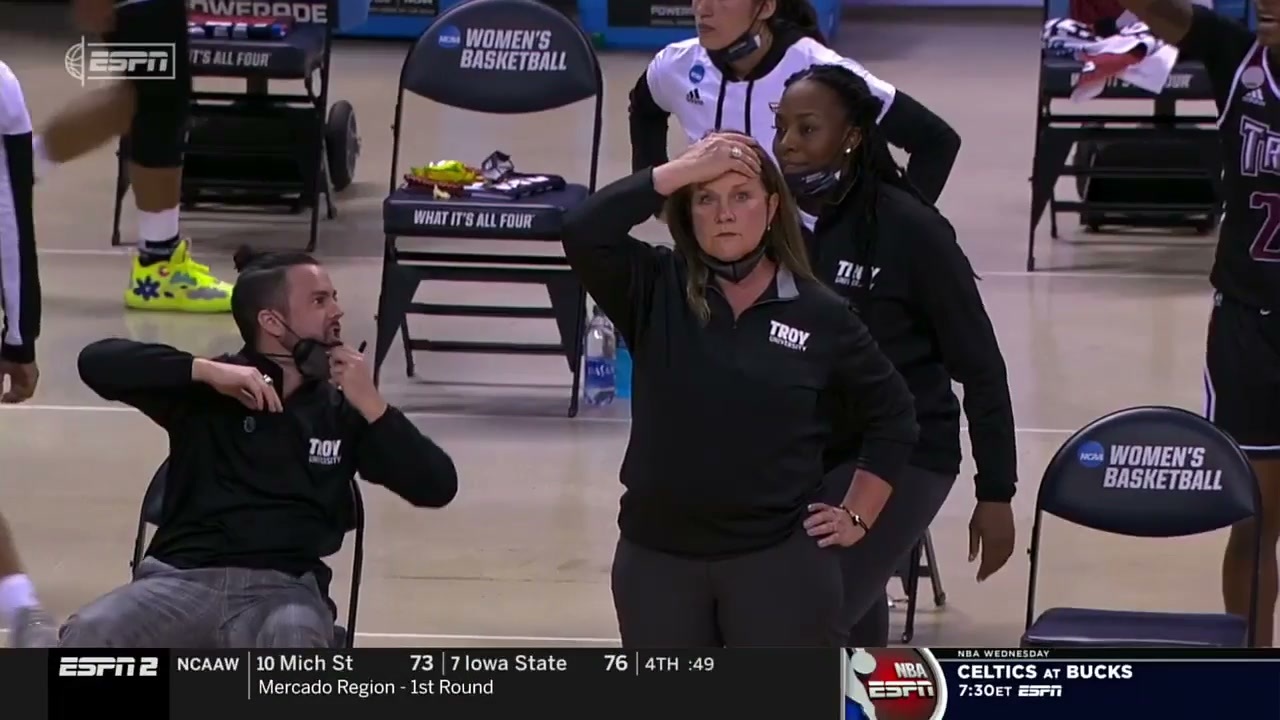On Sunday, the story of the women's tournament was order. All chalk. On Monday, the story was lawlessness. In three first-round games, favored teams lost: No. 6 Rutgers rutgerly ceded a 12-point lead to No. 11 BYU; No. 13 Wright State stunned No. 4 Arkansas with some big shots late-game; and freshman Destinee Wells helped No. 12 Belmont get past No. 5 Gonzaga. Late in the 2-15 matchup between Texas A&M and Troy, the upset tally neared four. But a few dubious fourth-quarter calls prevented what would have been a historic toppling in the most exciting game of the day. The Trojans, condemned to the same tragic fate that has befallen all 107 women's tournament 15-seeds before them, leave without a win.
Troy started the second half down 14 points to the Aggies, a usually terrific team with an SEC regular-season championship and quality wins over South Carolina, Tennessee, and Arkansas. If Texas A&M has had anything to worry about of late, it's closing out games strong; going cold in the last five minutes of a loss to Georgia in the SEC tournament semifinal earlier this month may have cost them a 1-seed in this tournament. Troy took advantage of the Aggies' late-game inconsistency to claw back, not with a three-point barrage (they shot only 4-for-23 from outside) but by getting a bunch of unlikely midrange shots to fall. With a minute and a half to play in the fourth, the game was tied at 77.
Here, with the two teams now going point-for-point, is where the trouble began. Down two with less than a minute left, Trojans forward Tyasia Moore drove for an and-one that could have given Troy a lead. Instead, the officials waved off the basket and called an offensive foul on Moore, even though her defender didn't appear to be set. On the next possession, the Trojans' best player, Alexus Dye, was whistled for a tripping call probably meant for her teammate, and fouled out of the game. That put the Aggies on the free-throw line, where they extended their lead to three points with 30 seconds remaining.
The final, most devastating blow to Troy's chances was a non-call on what looked, to the Troy bench and to the commentators, like Texas A&M's Destinee Pitts committing an over-and-back violation, a potentially dramatic turnover after an exchange of free throws had closed the gap to two. Out of a timeout with four seconds left on the clock, Kayla Wells inbounded the ball to Pitts, who touched it in the frontcourt and seemed to gain possession there, just before crossing into the backcourt. The officials only called the foul on her defender, and Pitts made her two free throws to seal the game.
"It just looked like she touched it and then it went backcourt. It just looked very evident that that happened, and we were seeing if we could get the call corrected but just not the way it went," Troy coach Chanda Rigby said after the game. "We had all the momentum at that point. If that was a correct call, and if we would have gotten that call, I don’t think there’s any way we would have lost the game, because I don’t think the will of my players would have allowed us to lose."
The real officiating question, and a trickier one to answer, was where Pitts was when she established control of the ball—not when she first touched the ball trying to receive the pass, but when she began dribbling. In a statement sent to the pool reporter, Penny Davis, the national coordinator of NCAA women's basketball officiating, answered, "This was an extremely close play. The officials judged that control of the basketball was not gained until the Texas A&M player was in the backcourt. It was as close as they come. No camera or person had a better angle on the play than the official."
She is forgetting about upset-hungry me, who had the best angle on the play from my living room television, and hereby declares Troy robbed.






